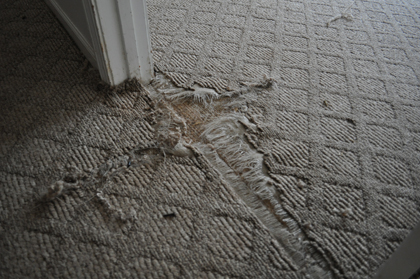An Afford Anything reader recently emailed me about this dilemma:
He’s upside-down on his home. He owes more than the house is worth.
But he wants to take advantage of today’s low housing prices, which will let him move his daughter into the best school district in town. He can put 10 percent down on a new house in a fantastic school district.
He’d lose money if he sold his current home. There are only two ways he can sell it: either bring cash to the closing table (i.e. pay extra to get rid of it!) or process an excruciating short sale, which would destroy his credit.
Both of those choices are off the table. He wants to rent out his current home until the market recovers enough that he can sell it. But is this a good idea?
Check out the details:
MONTHLY INCOME
Rent: $1,600
MONTHLY EXPENSES
Mortgage + Association Payment: $1,200
Vacancy: $100 *
Repairs, Maintenance: $50 – $100 **
Property Manager: $100
Total Expenses: $1,450
This leaves him with $100 – $150 per month in cash flow.
Hold On, Where Did You Get Those Vacancy / Maintenance Numbers?
If the house is vacant one month per year, we can average that out to a monthly vacancy cost of $100. Of course, if it sits vacant for 3-5 months, he’ll be sweating.
The “rule of thumb” is that maintenance will cost 1 percent of the purchase price of the house. Of course, that’s a long-term annualized average. It includes rare, expensive repairs like replacing the roof every 20-25 years and re-painting the siding every 5 years.
Since he has an association payment, I assume his homeowner’s association takes care of all exterior maintenance. That brings his maintenance costs down. (Well, really, it just lumps his maintenance costs into a different category).
Assuming his house is in good condition, his big maintenance costs will rare but costly events like replacing the water heater, buying a new refrigerator, etc. He won’t literally pay $100 every month. Like his vacancy costs, this maintenance cost is a long-term average over the span of many years.
He reported a property management fee of $100 per month in the email that he sent me. That seems rather cheap (it’s only 6 percent of the rent), but some property managers will charge a cheaper fee in a neighborhood with higher tenant quality, so I’ll accept that premise at face value. (Some property managers charge one month’s rent as a “placement fee” for finding a tenant, which is NOT included here.)
So What Do You Recommend?
Here’s my advice:
#1: Use your $100 – $150 monthly cash flow to build some cash reserves. Use this to cover the mortgage payments when your house sits vacant. Vacancy is your single biggest risk, because you’ll have to cough up the cash for two mortgages (your rental house and the home you live in). Strong cash reserves are the single biggest weapon you have against this risk.
#2: Add even more money to those cash reserves so that you can quickly write checks for repairs and maintenance. What if the house sits vacant for 4 months, a tenant moves in, and a week later you need to call a plumber? Cash reserves will help you sleep better at night.
#3: Don’t even think about making “extra” mortgage payments before you have huge cash reserves built.
I’d recommend a minimum cash reserve of 6 months of mortgage payments, and an optimal cash reserve of 8 to 10 months. That way, if you deal with an extended vacancy, you’ll be able to cover the mortgage.
Many landlords “shoot themselves in the foot” by panicking about a vacancy and renting out their home to the first willing tenant that comes along — even if their gut instinct says it might not be a good tenant. That always leads to disaster.
If you have cash reserves to deal with a vacancy, you can take your time and wait for the right tenant — a good tenant — instead of accepting the first person who’s willing to move in.
One of my houses has been vacant for almost three months. (It’s the $21,000 foreclosure, which is in a part of town that doesn’t always attract — um — the most qualified candidates). I’m guessing that the house might sit vacant for four or five months before I get someone in there.
But here’s the thing: Several people said they’re interested in moving in. But none of them have met my tenant criteria. It’s nice to be able to hold out and wait, so that you’ll eventually get the right tenant, not the first one.

